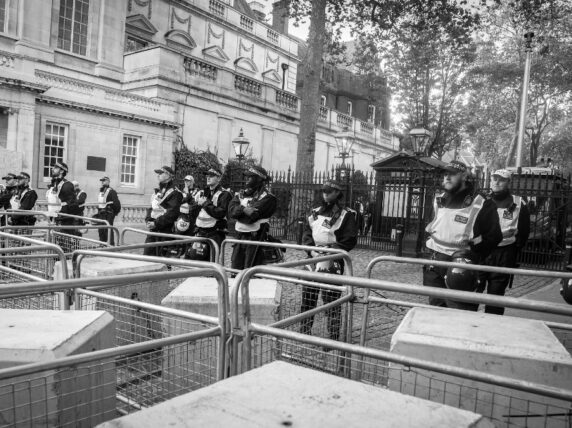A super year of not-so-super elections: How autocratic regimes are hijacking the polls – and how to reclaim them
Among the 74 countries and territories with national elections this year, 20 are categorised as “electoral autocracies” by the Varieties of Democracy (V-Dem) project.
Electoral autocracies refer to countries in which multiparty elections are held but are significantly flawed. These problems may range from serious constraints on freedom of expression and association to more blatant manipulation of the electoral process.
V-Dem downgraded India, the most populous country in the world, to this category in 2021, meaning electoral autocracies now house 44% of the world’s population. Why these countries are considered autocracies despite holding elections is not hard to understand when we take a closer look at the 2024 pool.
Tilted playing fields and the veneer of choice
In February, El Salvador held elections amid a state of emergency adopted almost two years prior which enabled authorities to commit widespread human violations, including mass arbitrary detention. President Nayib Bukele won a presidential race in which he was constitutionally ineligible to run after pushing for electoral reforms that undermined pluralism and tilted the playing field in favour of his party.
In March, Vladimir Putin won what was arguably the least credible election in post-Soviet Russia. Real opposition candidates were unfairly disqualified, leaving only a few token contenders to check the box. Opposition leaders also faced serious challenges in reaching out to the public and getting fair media coverage due to Putin’s decades-long project to eliminate independent media and opposition voices.
Virtually no independent monitors were granted access to the electoral process, preventing fraudulent practices from being exposed. A Russian independent watchdog noted reports from citizens who were pressured to vote for Putin across the country or whose ballots were checked by the police before they could cast them. As if the manipulation within its borders were not enough, Russia also held sham elections on occupied Ukrainian territory.
India’s phased elections, which began in April and are slated to conclude in early June, have been in the spotlight, but not for good reasons. Considered the “world’s largest democracy,” India used to draw the world’s attention for its impressive logistics which enabled voters to cast their ballots across deserts and mountains. In 2024, however, most reporting has focused on human rights concerns and voter suppression, particularly targeting Muslims.
Other incumbents are just waiting their turn to proclaim victory in largely theatrical elections. In Rwanda, experts believe election results won’t be much different from 2017, when Paul Kagame took 99% of the vote, as intimidation, unfair registration practices and other irregularities remain in place. Despite some short-lived optimism about Venezuela following international negotiations, President Nicolas Maduro showed the world he was not willing to change his tactics, cracking down on political dissent, arresting or banning opposition leaders, and establishing a timeline for elections designed to favour his party.
Reclaiming the electoral stage
Autocratic elections are a real threat to democracy. They can give a veneer of choice that might keep part of the population – and the international community – from pressuring and fighting for change. Because the concepts of elections and democracy are so often intertwined, citizens might lose faith in democracy if their election fails to provide genuine representation.
But completely dismissing these elections might not always make sense. Even some extremely flawed elections have offered opportunities for democratic actors to seek change, even if they cannot immediately and meaningfully affect election outcomes. In Russia, for instance, thousands of voters queued up to vote at noon as a symbolic protest inspired by late opposition leader Alexei Navalny. While there were no viable choices on the ballot, the lines at polling stations let pro-democracy citizens know they were not alone.
In Venezuela, opposition leaders who were barred from running for office this year have so far managed to maintain a coalition in support of a new opposition representative. By committing to supporting one single opposition candidate no matter how many others are disqualified, the opposition can consolidate votes and make it at least a little harder for the Maduro government to rig the elections.
In Belarus in 2020, grassroots pro-democracy movements employed an artificial intelligence parallel vote tabulation system to expose what genuine election results would look like if Alexander Lukashenko’s regime didn’t manipulate them, effectively legitimising opposition leader Sviatlana Tsikhanouskaya, who has since led the country’s democratic movement. Back in the early 2000s, Georgia’s 2003 Revolution and Ukraine’s 2004 Orange Revolution went even farther in achieving changes of power.
In 2024 and beyond, autocrats will continue to use elections as political theatre, lending a veneer of legitimacy to their governments, often borrowing tactics from each other and collaborating to entrench their rules. Acts of defiance like the ones mentioned above all involve risks. The brave democratic champions carrying them out need all the support they can get from the international community and remaining independent institutions in their countries, even when things look irreparable, so they can call out the hijackers, halt democratic backsliding, and reclaim the stage that is rightfully theirs.
Category
News & ViewsThemes
Civic space


